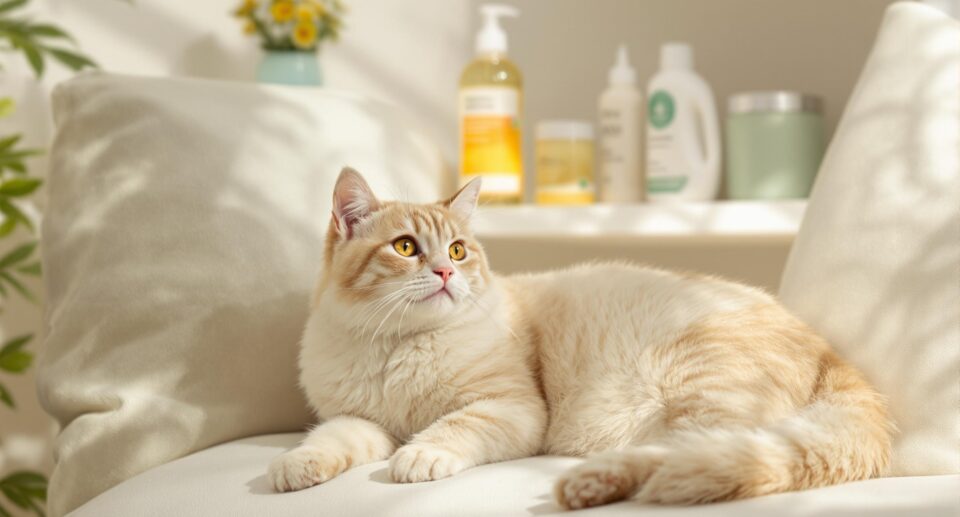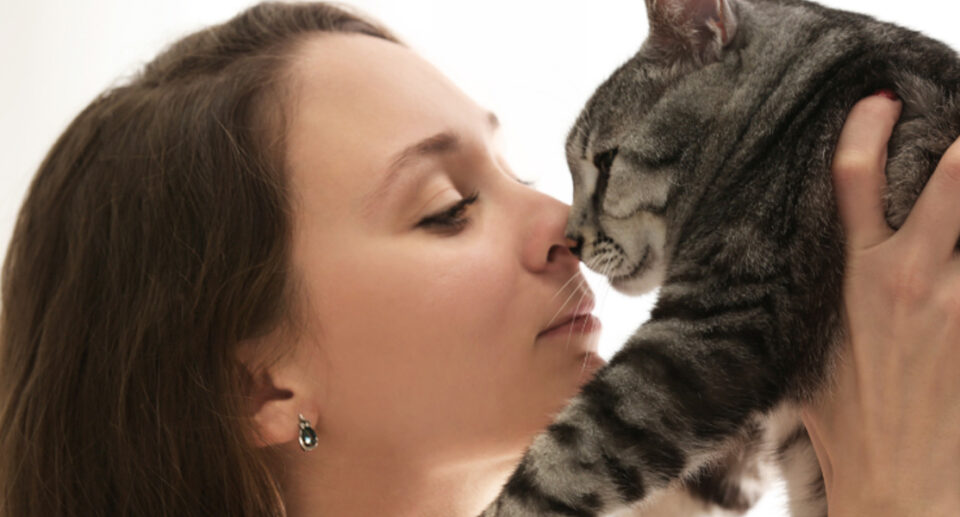
Do you ever catch your cat spraying urine in your home? Or do you discover odors and stains reappearing day after day? Urine marking can quickly become a serious sanitation issue, and it’s one of the top reasons cats are surrendered to shelters. Learn how to stop spraying in cats so you don’t have to choose between a clean home and your best feline friend.
What Is Spraying in Cats?
“Spraying,” refers to when a cat backs up against a vertical object like a wall or a chair, lifts their tail, and sprays out a small amount of urine. It’s not to be mistaken with urinary issues or incontinence, which manifests as leaking while resting or expelling the full contents of their bladder anywhere outside of the litterbox.
Spraying is usually observed in adult cats, mainly unneutered males but it’s also seen in females and spayed/neutered cats. It starts as early as six months when the cat will have reached sexual maturity.
Cats spray to mark their territory. In the wild, their distinct scent lets other cats know that they are not welcome on the marker’s turf.
Occasionally, though, spraying occurs in female cats when they’re in heat. Once your cat is spayed, they will no longer go into heat and ultimately should no longer spray.
What Can Trigger Spraying in Cats?
If your kitten suddenly starts spraying around your home, they may have recently reached sexual maturity. This is particularly seen in cats that have not been neutered early in life. Neutering before your cat is six months old can minimize spraying, though the behavior can occur even with neutered cats.
Adult cats that have recently started spraying may be suddenly feeling anxious or insecure. If there’s a new cat, dog, or other family member in your household, your cat may start marking as a means to establish your home as their territory.
If your cat is not a budding new adult or in heat, and you haven’t had a recent change in your household, spraying behavior can be triggered by stress in general. Your cat might have an undiagnosed illness, or they may have experienced trauma recently.
How To Stop Spraying in Cats
When you catch your cat spraying, your first instinct may be to shout or rush towards your cat to pick them up. This reaction may scare your cat, and may even interrupt their behavior, but will ultimately not discourage them from spraying. Instead, they may choose to spray when you’re not around, in hidden areas that you might not discover until they start to develop an odor.
The most effective way to stop spraying is to eliminate, or at least help your cat cope with their source of stress.
For example, if you’ve recently brought home a new cat, a dog, or even a baby, your cat may feel better if they have more space of their own.
Make sure they have enough access to litterboxes, food bowls, water, and other resources, as well as plenty of beds, nooks, and vertical spaces. That way, they won’t be forced to interact with their new family member to have their needs met. With time, they may warm up to the newcomer at their own pace.
You can use anxiety relief products to help your cat feel at ease. Multi-cat families and parents of anxious cats swear by Feliway, a synthetic form of the feline facial pheromones that comes as a spray or room plug-in. Cat calming treats, anxiety supplements, and medications can all help your cat rediscover their zen – and stop spraying.
Cleaning Urine to Stop the Spray
The smell of your cat’s own urine can prompt them to continue spraying. Urine stains, even after regular cleaning, may still carry a faint scent that’s still detectable to cats. You can use a UV blacklight like the one included with the Urine-Off kit to find every urine stain in your home. Then, use an enzymatic cleaner to break down proteins in urine that regular cleaning agents can sometimes leave behind.
It takes time to reverse spraying behaviors in cats. In the meantime, it might make sense to confine your cat to an easy-to-clean area, or even a large tiered cat cage when you cannot supervise them.





